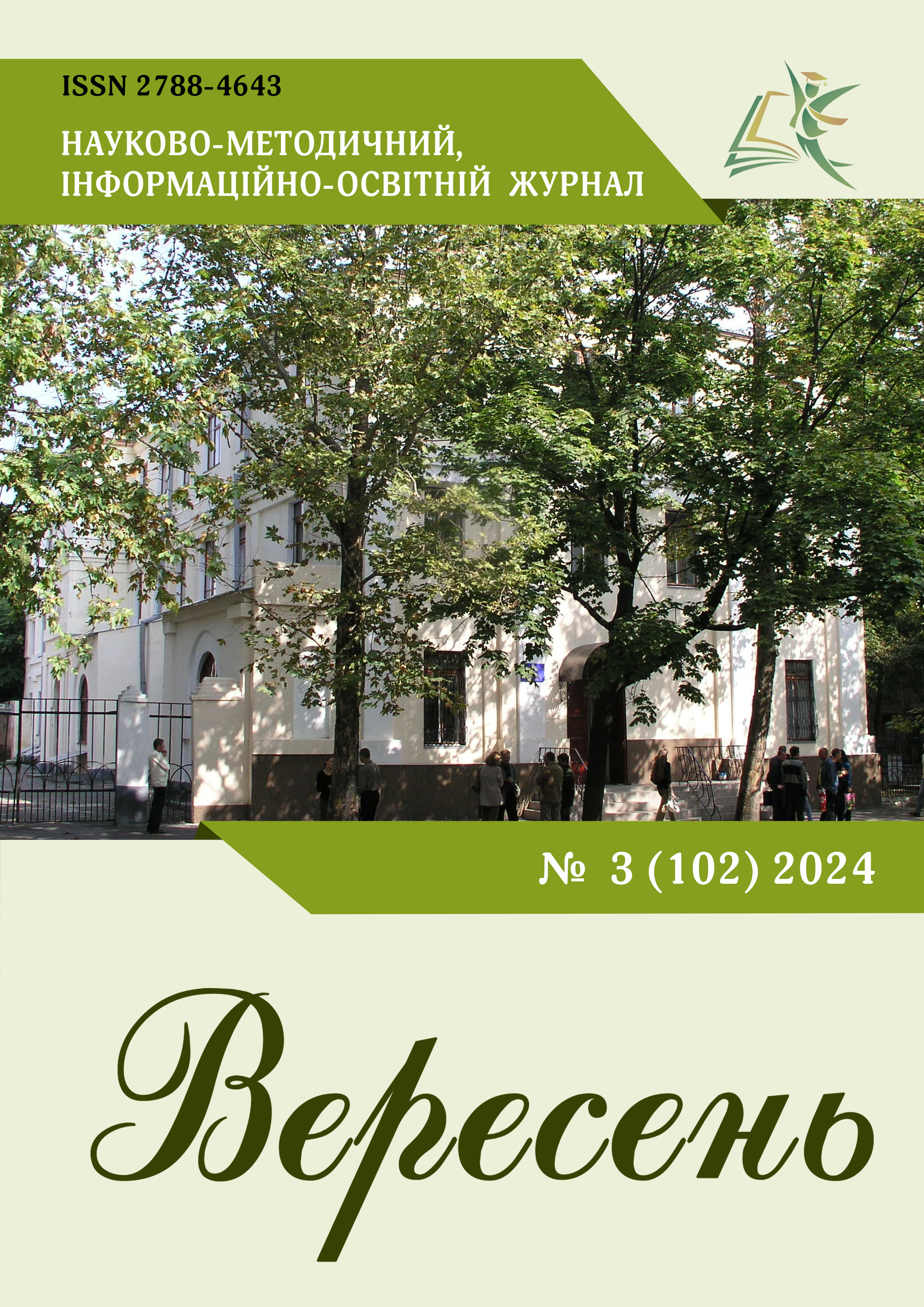THE ARTIFICIAL INTELLIGENCE INSTRUMENTS INFLUENCE ON THE PROFESSIONAL DEVELOPMENT OF PEDAGOGICAL WORKERS
DOI:
https://doi.org/10.54662/veresen.3.2024.09Keywords:
artificial intelligence, postgraduate pedagogical education, professional development, the AI instrumentsAbstract
The scientific article focuses on the investigation of the effects of artificial intelligence (AI) instruments on the professional developments of pedagogical workers within the system of postgraduate education. The author analyzes the approaches to the definition of the term «artificial intelligence» and clarifies on the modern technologies of AI that can be applicable in educational processes, namely adaptive systems of learning, the instruments for automatic assessment, educational data analytics, learning content generation instruments, etc. Having overviewed the scientific resources and the questionnaires of pedagogical workers of educational establishments in the Mykolaiv region concerning the usage of the AI instruments, it has been specified the advantages, particularly individualization and personalization of learning, flexibility and comfort, time saving and automatization of the routine tasks, motivation increasing and learning engagement, as well as risks, namely the need for significant technical resources, ethics and safety of the AI usage, dependence on technologies, decreasing of the level of critical thinking, interpersonal communication, and responsibility. For the first time, the results of the choice and application of the AI instruments by the pedagogical workers of the Mykolaiv region have been presented. Furthermore, it has been found out that the implementation of the AI instruments into the system of postgraduate study opens new possibilities for the professional growth of pedagogical workers; however, it requires careful planning, methodological support and substantial technical guidance, too.
References
Baranov, O. A. (2023). Vyznachennia termina «shtuchnyi intelekt» [Definition of the term «artificial intelligence»]. Informatsiia i pravo, 1 (44), 32–49 (ukr).
Cabinet of Ministers of Ukraine. (2020). Concept of AI development in Ukraine until 2030. Retrieved from: https://zakon.rada.gov.ua/laws/show/1556-2020-%D1%80#Text (ukr).
Cambridge Dictionary. «Artificial Intelligence». Cambridge University Press. Retrieved from: https://dictionary.cambridge.org/dictionary/english/artificial-intelligence (eng).
Chiu, T. K., Xia, Q., Zhou, X., Chai, C. S., & Cheng, M. (2023). Systematic literature review on opportunities, challenges, and future research recommendations of artificial intelligence in education. Computers and Education: Artificial Intelligence, 4, 100118. DOI: https://doi.org/10.1016/j.caeai.2022.100118 (eng).
European Commission, Directorate-General for Education, Youth, Sport and Culture. (2022). Ethical guidelines on the use of artificial intelligence (AI) and data in teaching and learning for educators. Publications Office of the European Union. Retrieved from: https://data.europa.eu/doi/10.2766/153756 (eng).
EU-U.S. Terminology and Taxonomy for Artificial Intelligence - Second Edition. Retrieved from: https://digital-strategy.ec.europa.eu/en/library/eu-us-terminology-and-taxonomy-artificial-intelligence-second-edition (eng).
Huraliuk, A. H. (2023). Shtuchnyi intelekt yak innovatsiina informatsiina tekhnolohiia u pedahohichnykh doslidzhenniakh (analitychnyi ohliad) [Artificial intelligence as an innovative information technology in pedagogical research (analytical review)]. Analitychnyi visnyk u sferi osvity y nauky, 67. Retrieved from: https://lib.iitta.gov.ua/739798/1/VNIASO-AHS%20of%20Edu%26Sci-RB-18-2023-67-79.pdf (ukr).
IBM. (2023). Artificial Intelligence. Retrieved from https://www.ibm.com/topics/artificial-intelligence (eng).
Klymeniuk, N. V. (2021). Mobilnist yak vazhlyvyi chynnyk profesiinoi adaptatsii molodoho pedahoha [Mobility as an important factor in the professional adaptation of a young teacher]. Veresen, 2 (89), 26–34. DOI: https://doi.org/10.54662/veresen.2.2021.03 (ukr).
Marienko, M. & Kovalenko, V. (2023). Shtuchnyi intelekt ta vidkryta nauka v osviti [Artificial intelligence and open science in education]. Fizyko-matematychna osvita, Sum. derzh. ped. un-t imeni A. S. Makarenka. Fiz.-mat. f-t, 1 (38), 48–53. DOI: https://doi.org/10.31110/2413-1571-2023-038-1-007 (ukr).
Ministerstvo osvity i nauky Ukrainy. (2024). Instruktyvno-metodychnykh rekomendatsii shchodo zaprovadzhennia ta vykorystannia tekhnolohii shtuchnoho intelektu v zakladakh zahalnoi serednoi osvity (Proiekt). [Ministry of Education and Science of Ukraine. (2024). Instructional and methodical recommendations on the introduction and use of artificial intelligence technologies in general secondary education institutions (Project).]. Retrieved from: http://surl.li/kqpqqp.
Ministerstvo osvity i nauky Ukrainy. (2024). Stratehichnyi plan diialnosti Ministerstva osvity i nauky Ukrainy do 2027 roku «Osvita peremozhtsiv». [Ministry of Education and Science of Ukraine. (2027). Strategic activity plan of the Ministry of Education and Science of Ukraine until 2027 «Education of winners»]. Retrieved from: https://mon.gov.ua/storage/app/media/Strateh.plan.diyalnosti.MON.do.2027.roku.pdf (ukr).
Popenici, S. A., & Kerr, S. (2017). Exploring the impact of artificial intelligence on teaching and learning in higher education. Research and Practice in Technology Enhanced Learning, 12(1), 22. DOI: https://doi.org/10.1186/s41039-017-0062-8 (eng).
Rostoky, M. L. & Bondarenko, T. S. (Eds.). (2023). MON Ukrainy, UIPA, NAPN Ukrainy, DNPB Ukrainy im. V. O. Sukhomlynskoho. Rozbudova yedynoho vidkrytoho informatsiinoho prostoru osvity vprodovzh zhyttia (Forum-SOIS, 2023) [Ministry of Education, Culture, Sports, Science and Technology of Ukraine, UIPA, National Academy of Sciences of Ukraine, National Institute of Education and Research of Ukraine named after V. O. Sukhomlynskyi]. Vinnytsia: TVORY. Vyp. 4. DOI: https://doi.org/10.33407/lib.NAES.736724 (ukr).
Russell, S. J. & Norvig, P. (2016). Artificial Intelligence: A Modern Approach, 3rd. Eds. Harlow, Pearson. https://people.engr.tamu.edu/guni/csce421/files/AI_Russell_Norvig.pdf (eng).
UNESCO. (2023). Draft AI competency frameworks for teachers and school students. Retrieved from: https://www.unesco.org/sites/default/files/medias/fichiers/2023/12/UNESCO-Draft-AI-competency-frameworks-for-teachers-and-school-students_0.pdf. (eng).
Zawacki-Richter, O., Marín, V. I., Bond, M., & Gouverneur, F. (2019). Systematic review of research on artificial intelligence applications in higher education – where are the educators?. International Journal of Educational Technology in Higher Education, 16(1), 39. DOI: https://doi.org/10.1186/s41239-019-0171-0 (eng).




